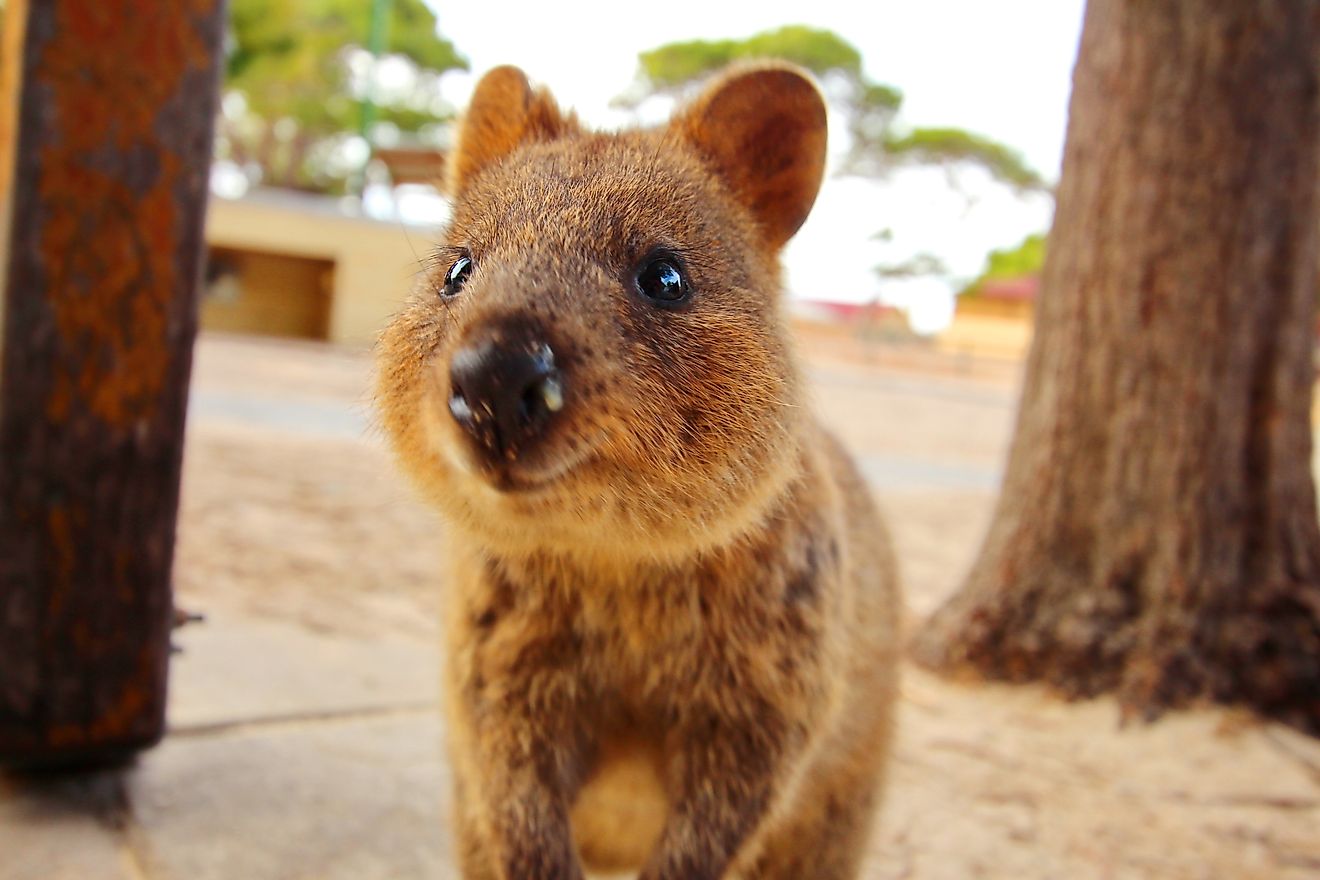Quokka Facts: Animals of Oceania

5. Physical Description
The quokka is the smallest of the wallaby species. It has thick, coarse, grey-brown short fur, with lighter and darker shades varying between individuals. It has rounded short fluffy ears, a naked snout, and short hind legs. The Quokka's close-haired tails are between 10.2 and 12.2 inches (25.8-31 centimeters) long, and are tapered towards their ends. Quokka’s hind feet are between 3.9 and 4.7 inches (10-12 cm). According to research by the Australian Department of Environment, male and female quokkas vary somewhat in size. A male will grows to 1.8 feet (54 centimeters) long and weigh up to 9.3 pounds (4.2 kilograms), while the females grow to around 1.6 feet (50 centimeters) and weigh up to 7.7 pounds (3.5 kilograms).
4. Diet
Quokkas are herbivorous, and eat grasses, leaves, stems, and from various native plants. A quokka feeds at night by foraging through vegetation, and can climb trees for leaves. A quokka’s choice diet is is young, soft vegetation. Researchers have observed quokka browsing on early stage vegetation on swamps, growing less than three months after a fire. By analyzing quokka fecal matter, scientists found that a combination of thomasia, dampiera hederacea, bossiaea aquifolia, mirbelia dilatata, and agonis linearifolia, all plants and herbs found in Australia, comprised 71 percent of its diet.
3. Habitat and Range
Quokkas have a range limited to a small part of Australia. Rottnest and Bald islands and the southwest regions of Western Australia's mainland is where quokkas' habitats are to be found. These regions are characterized by either dense vegetation or semi-arid, uncultivated areas near swamps. Quokkas prefer warm climates, and can survive in semi-arid areas, or areas with seasonal variations that include semiarid conditions. The International Union for Conservation of Nature (IUCN) lists the quokka as a "Vulnerable" species, due to threats to its habitat through, logging, burning, human development, and swamp destruction by feral pigs. Introduction of feral cats and foxes into the regions has also led to declines in their populations on the mainland. The IUCN estimates the population for mature quokkas at about 7,850 to 17,150 worldwide. Due to their lack of fear of humans and their "Vulnerable" status, people can be fined in Australia for unnecessarily invading quokkas' personal spaces.
2. Behavior
The quokka is a highly social mammal, and up to 150 of them may be live together in one territory, especially those near plentiful water sources. Dominant males will sometimes aggressively defend their territories. Light fights also occur when males compete for shady places to stay cool on a hot day. They create their own pathways for feeding, which also shield them from predators as they move at night. To get from one place to another, Quokkas move in a hopping motion akin to that of their relatives, the kangaroos. On Rottness Island, quokkas have been curious enough to approach humans. Due to this and their seemingly "smiling" appearances, they have hence been informally declared as the "happiest animal in the world".
1. Reproduction
A quokka reaches sexual maturity between just over a year to 18 months following birth. In a year, a quokka female only gives to one offspring. They can breed all year round on the Australian mainland, though the breeding season on Rottnest Island is generally limited from January to August. After mating, the gestation period is about 28 days. As soon as one day after birth, a female may mate again.The young ones remain in their mothers' pouches for around 6 months thereafter. After leaving the pouch, quokkas continue suckling until 8 months, at which time they are typically weaned. In its lifetime, a female quokka in mainland Australia can give birth to 17 offspring. The Quokka has an average lifespan of 10 years.











